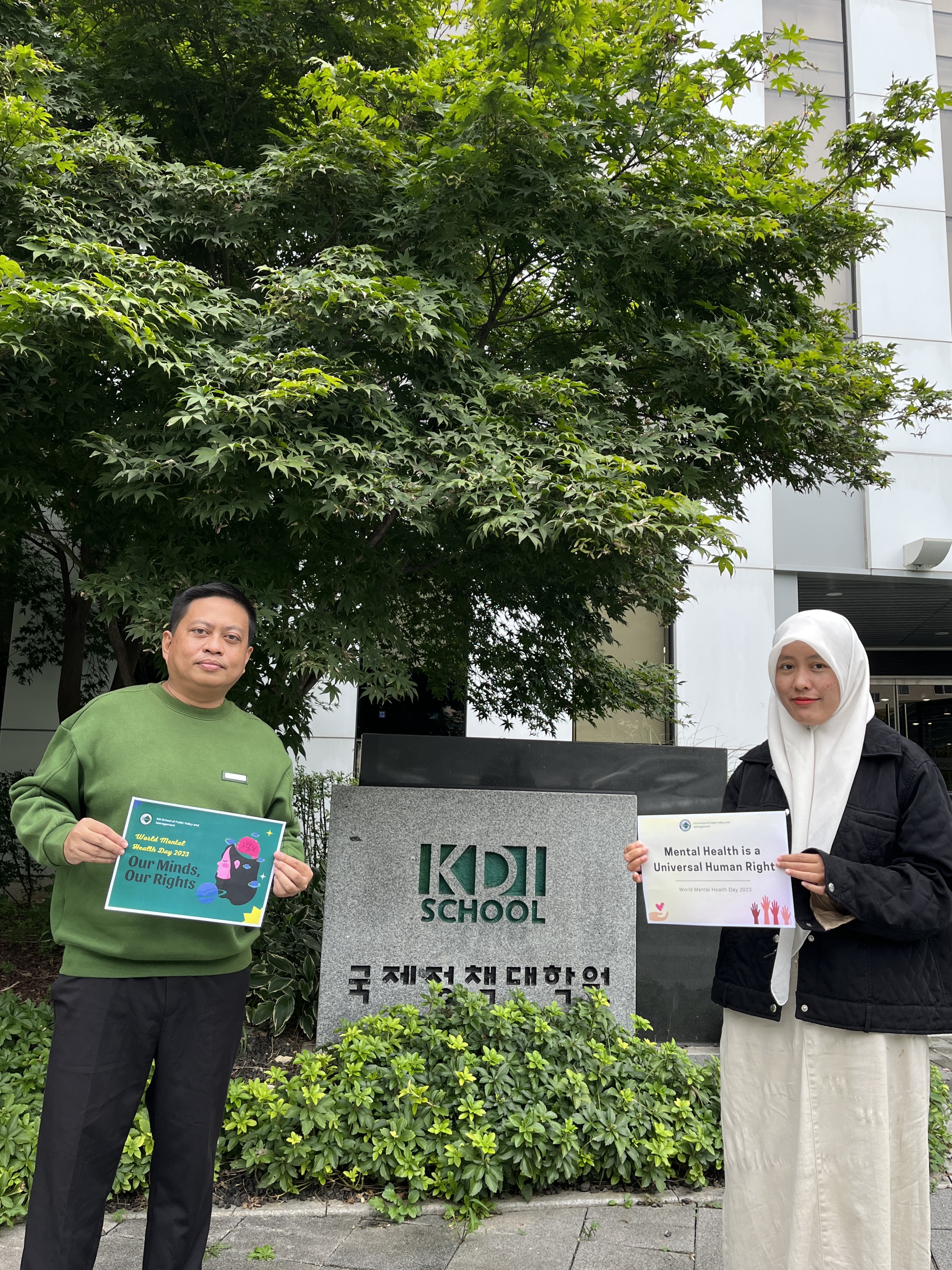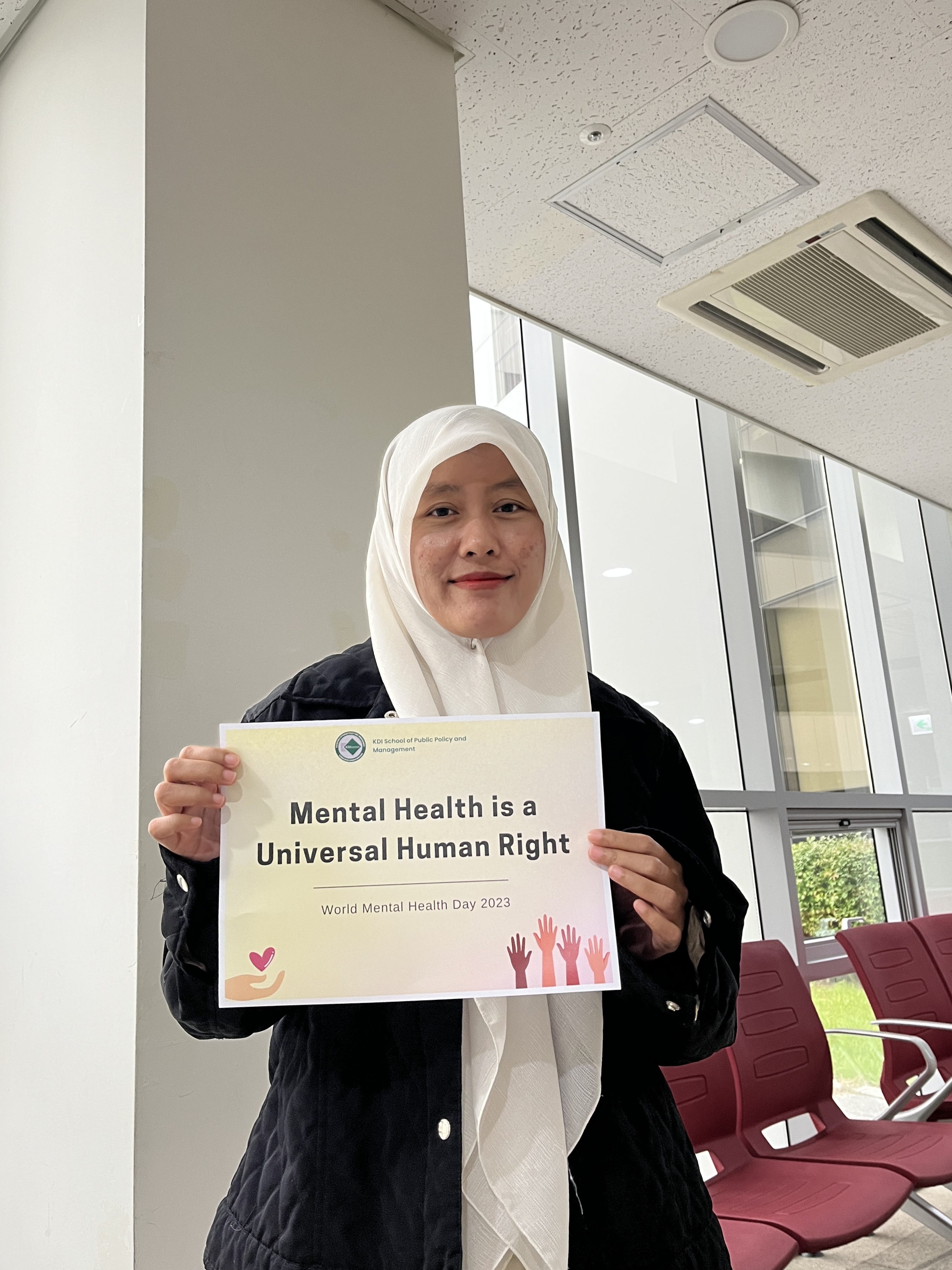
World Mental Health Day 2023 (1) - Destigmatizing Mental Health
- Date 2023-10-13 10:54
- CategoryStory
- Hit1083
“Mental Health is a universal human right” is the theme for World Mental Health Day 2023. This year, we stress the importance of mental health as a part of human rights, where every individual should have the right to mental well-being and access to mental health care and support.

Joining us are Suci Sekarwati, an experienced journalist and mental health advocate from Indonesia, and Richie Silvestre Enecillo, a senior health program officer from the Department of Health in the Philippines. In the first part of the interview, we discussed society’s perceptions of mental health and how it is often stigmatized.
Why is it important to understand mental health?
Richie & Suci: We believe there is a lack of acknowledgment regarding the significance of mental health, often overlooked in society. Recognizing the importance of this matter is crucial, as it pertains not only to an individual's mental well-being but also has implications for their physical health. It is an important component of our overall well-being. Understanding the relationship between mental health and physical health will lead us to a better overall sense of wellness. With good mental health, we’re able to live a more peaceful and balanced life.
How is mental health perceived in today’s society?

Richie: I would say there have been improvements in perception in most societies compared to previous decades. However, the stigma still persists. Mental health challenges are often viewed as a sign of fragility and vulnerability in an individual. Despite notable progress in raising awareness about mental health, our society is still far from recognizing the importance of mental health.
Suci: In Indonesia, image and dignity are significant parts of our culture, and people will do anything to avoid embarrassment and maintain the respect of others. Unfortunately, mental health challenges are viewed as a source of shame, not only for the affected individual but also for their family. As a result, many individuals grappling with mental health issues are told to keep their struggles hidden to preserve their reputation. It’s even more extreme in rural areas. There is a practice called ‘pasung,’ where families confine the affected individual to a room, isolating them from the outside world. This is done to prevent the individual from causing any disturbance and to shield them from public humiliation.
Richie: Practices such as these exist in the Philippines too. If anything, it highlights our society's reluctance to shift its attitudes towards mental health. The system also remains broken and lacks the necessary resources and facilities to address this issue adequately. In the end, individuals are left to grapple with mental health challenges without the proper support.
Is there a difference in mental health perception between certain groups?

Richie: In general, there is a predominantly negative perception across all demographics. For males, expressing emotions is often viewed as a sign of weakness, as it implies letting down one's guard and displaying vulnerability. Similarly, females face this negative perception, being unfairly labeled as prone to overreacting to life's challenges.
Suci: Both adults and children face mental health issues in different ways. Children are growing in a fast-paced environment where they constantly face academic pressure. Additionally, bullying is such a big issue in many schools. Meanwhile, adults are confronted with pressures stemming from their responsibilities, whether in the workplace or at home, where they shoulder the responsibilities of running the household.
What are the general stigmas that surround mental health?
Richie: There are so many, just as we mentioned earlier. The general perception of mental health is that if you face mental health challenges, you are unfairly labeled as ‘crazy.’ There’s also a pervasive tendency to have this comparative mindset, where one feels that if others are facing more significant difficulties, they have no right to express their struggles or complain. This invalidates the genuine struggles of those with mental health issues and, ultimately, it fails to address the root of the problem.
Suci: Based on my experience, mental health is often related to the depth of one’s faith and devotion to a religion. Human weakness is associated with a spiritual shortcoming, and experiencing mental health challenges is a consequence of sinning, inadequate prayer, or a lack of faith in a higher power.
How does stigmatization of mental health affect our daily lives?
Richie: To start with, supporting someone grappling with a mental health issue can be challenging. Relationships and families are often broken because the responsibility of caring for someone facing mental health difficulties can be overwhelming. This can lead to families distancing themselves because they may find it too burdensome to be connected. Similarly, in professional or educational settings, mental health challenges are often stigmatized as a sign of vulnerability and incapability. There's a common assumption that individuals facing mental health issues may not be suitable for certain roles or tasks due to an increased likelihood of struggling or experiencing a breakdown.
How can one prevent the stigmatization or negative perceptions of mental health?

Richie: Education plays such an important role. It is crucial to instill values of kindness, patience, and empathy in children right from the grassroots. Altering the perception of mental health will educate the younger generation to be more embracing and willing to engage in conversations about mental health. At the same time, we must refrain from dismissing emotions and sentiments and instead proactively work towards addressing mental health issues effectively.
KDI School provides counseling services for anyone who is facing mental health issues, or even if you are an individual supporting a troubled loved one.
Contact a counselor at:
Phone: 044-550-1840
KakaoTalk: counselingkdis
Email: counseling@kdis.ac.kr
Location: S311 Human Rights Center
2023 Spring / MPM / Malaysia
aida.assilah@gmail.com
Related News
-
Story1 day ago
I felt like the snow was there to welcome us: Manju Kumari Jaisi (2023 MPP) -
Research and Education5 days ago
Republic of Korea Economic Bulletin, May 2024#KDI #Economic #KDISCHOOL #kdischool #Economic Bulletin #Research
-
Story19 days ago
KDIS Health Focus: A Day in the Life of Nurse Kim
